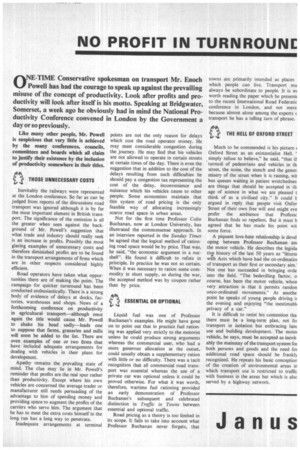NO PROFIT IN TURN ROUNE
Page 67

If you've noticed an error in this article please click here to report it so we can fix it.
ONE-TINIE Conservative spokesman on transport Mr. Enoch Powell has had the courage to speak up against the prevailing misuse of the concept of productivity. Look after profits and productivity will look after itself is his motto. Speaking at Bridgwater, Somerset, a week ago he obviously had in mind the National Productivity Conference convened in London by the Government a day or so previously.
Like many other people, Mr. Powell is suspicious that very little is achieved by the many conferences, councils, committees and boards which all claim to justify their existence by the inclusion of productivity somewhere in their titles.
points are not the only reason for delays which cost the road operator money. He may meet considerable congestion during the journey. He may find that his vehicles are not allowed to operate in certain streets at certain times of the day. There is even the suggestion that in addition to the cost of the delays resulting from such difficulties he should pay a congestion tax representing the cost of the delay, inconvenience and nuisance which his vehicles cause to other people. Some economists maintain that this system of road pricing is the only feasible way of allocating increasingly scarce road space in urban areas.
Not for the first time Professor Colin Buchanan, now at London University, has illustrated the commonsense approach. In an interview reported in the Sunday Times he agreed that the logical method of rationing road space would be by price. That was, he said, "the economic argument in a nutshell". He found it difficult to refute in principle. In practice he was not so certain. When it was necessary to ration some commodity in short supply, as during the war, the accepted method was by coupon rather than by price.




















































































































